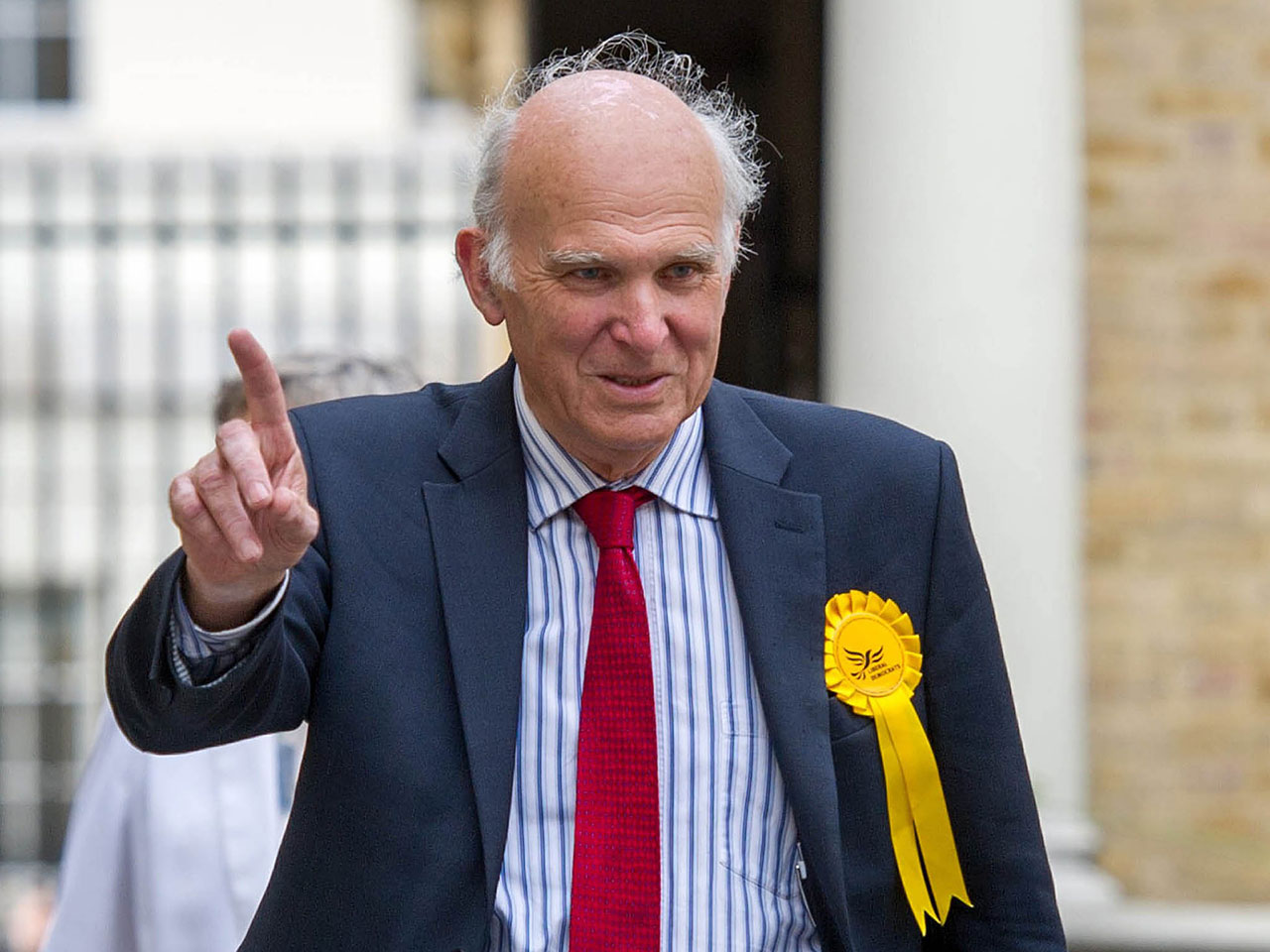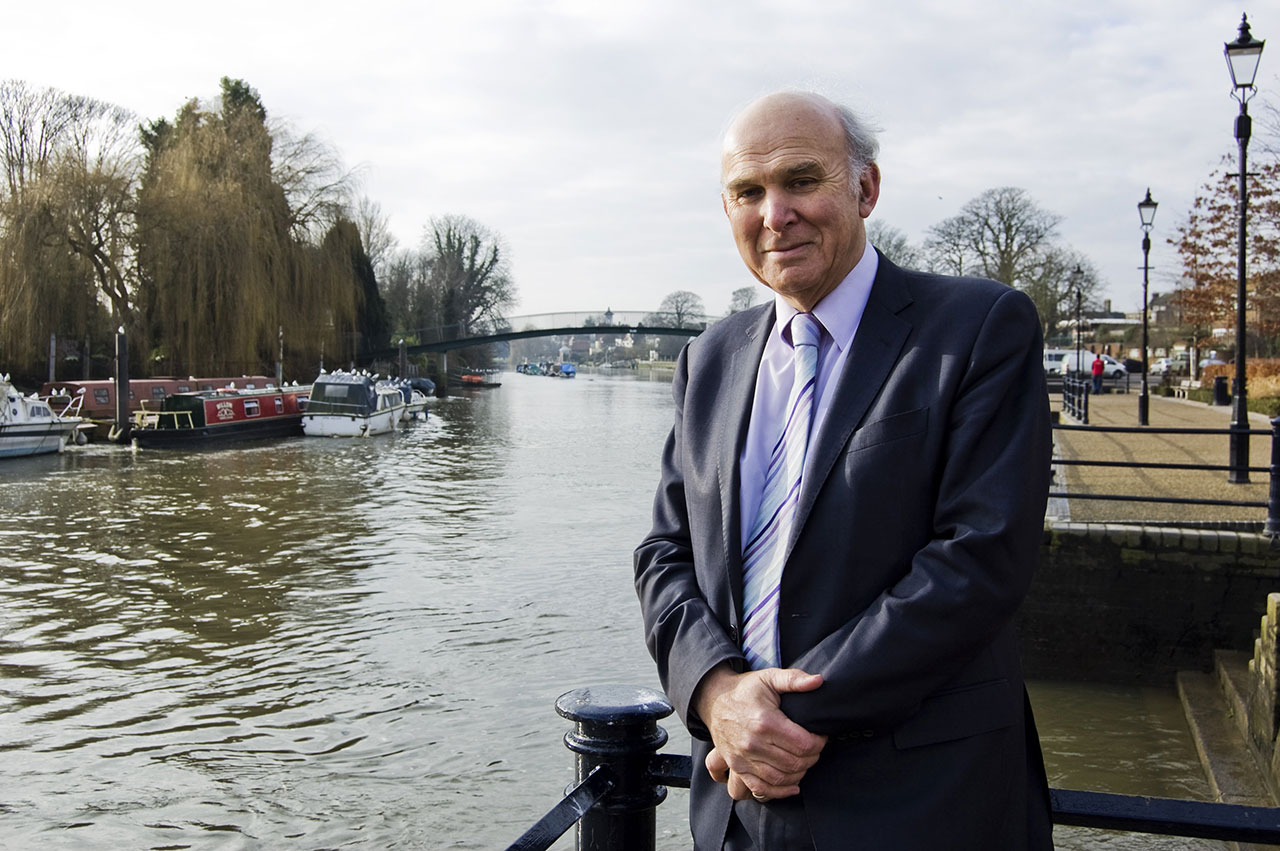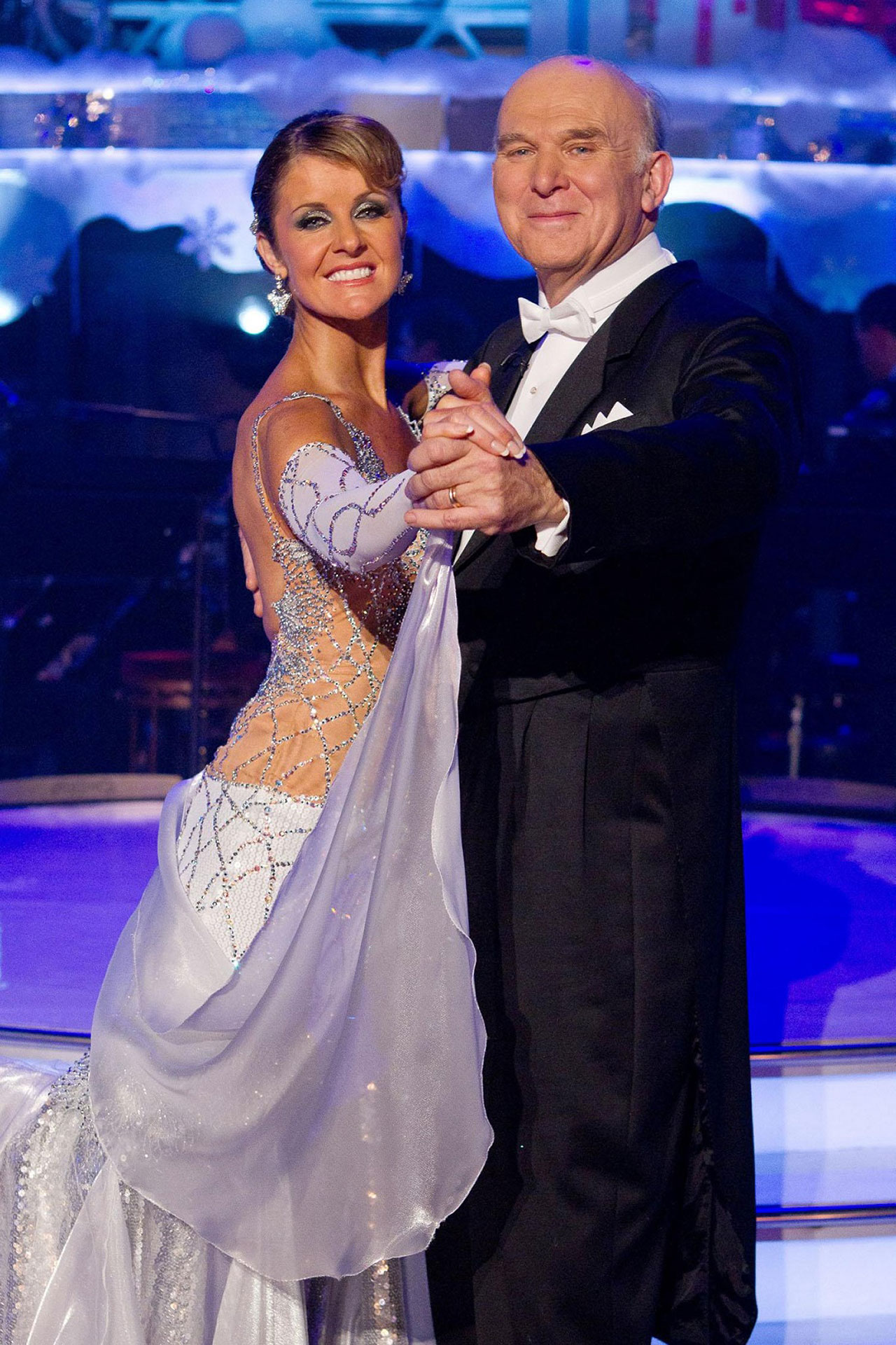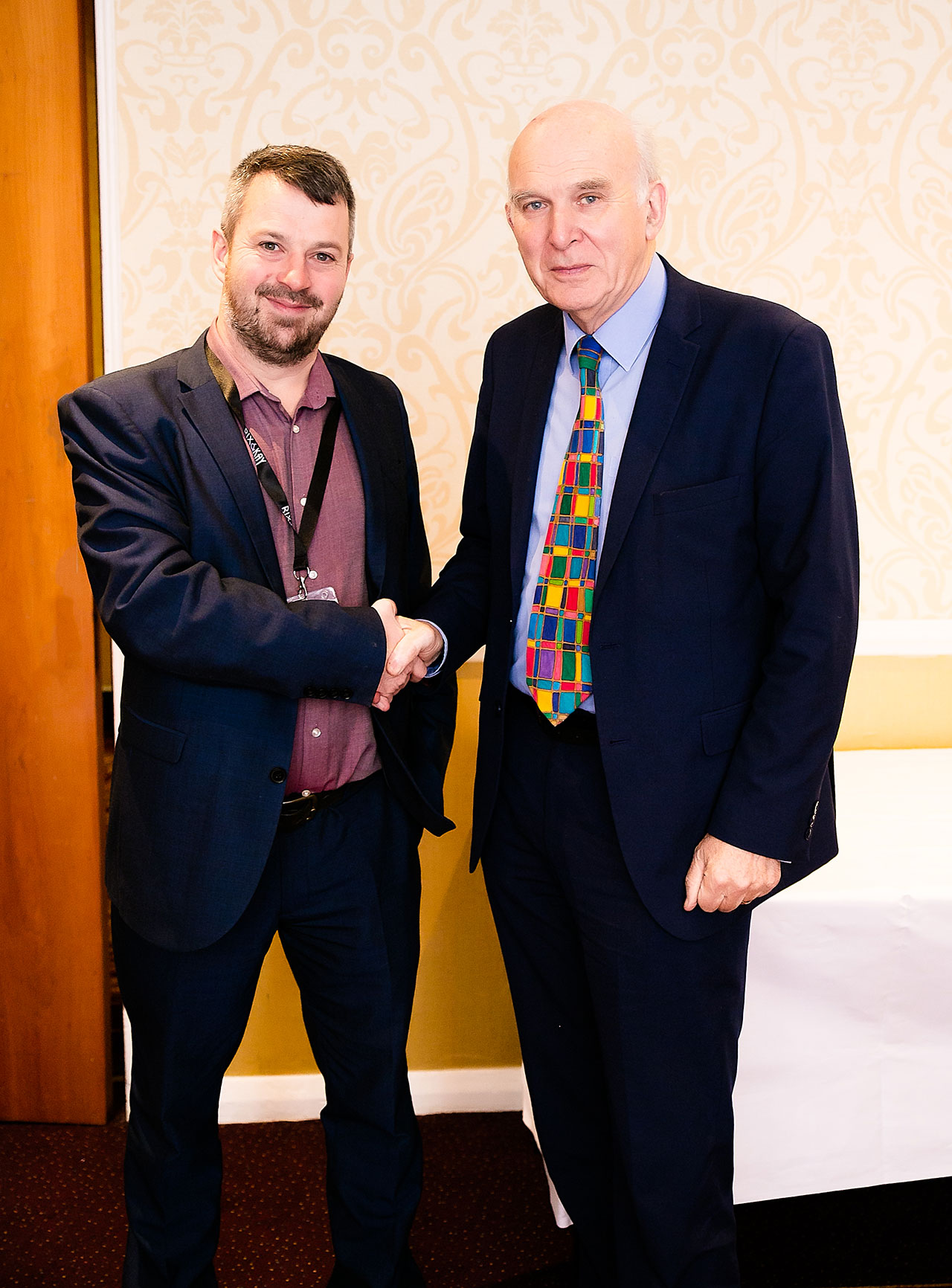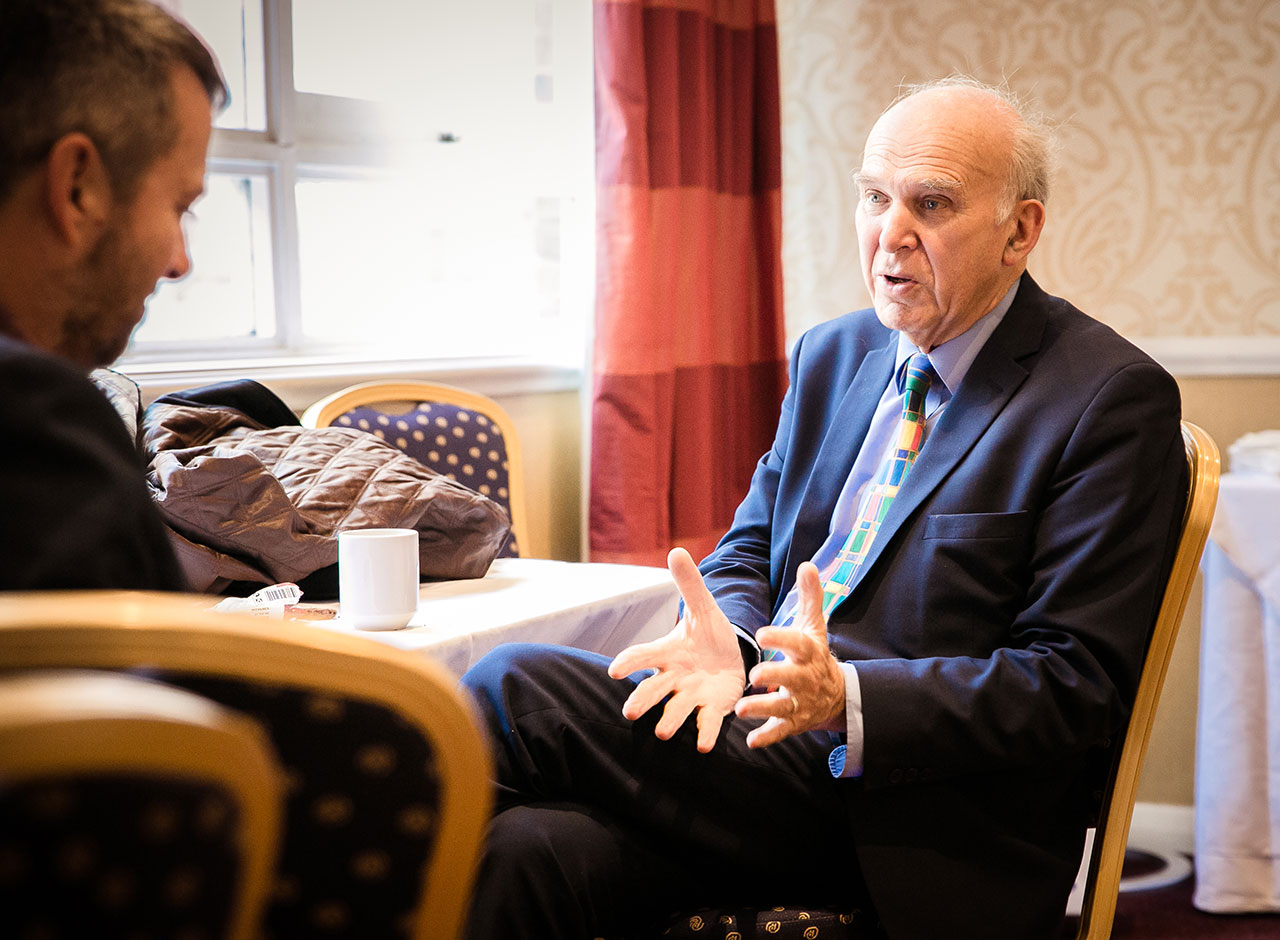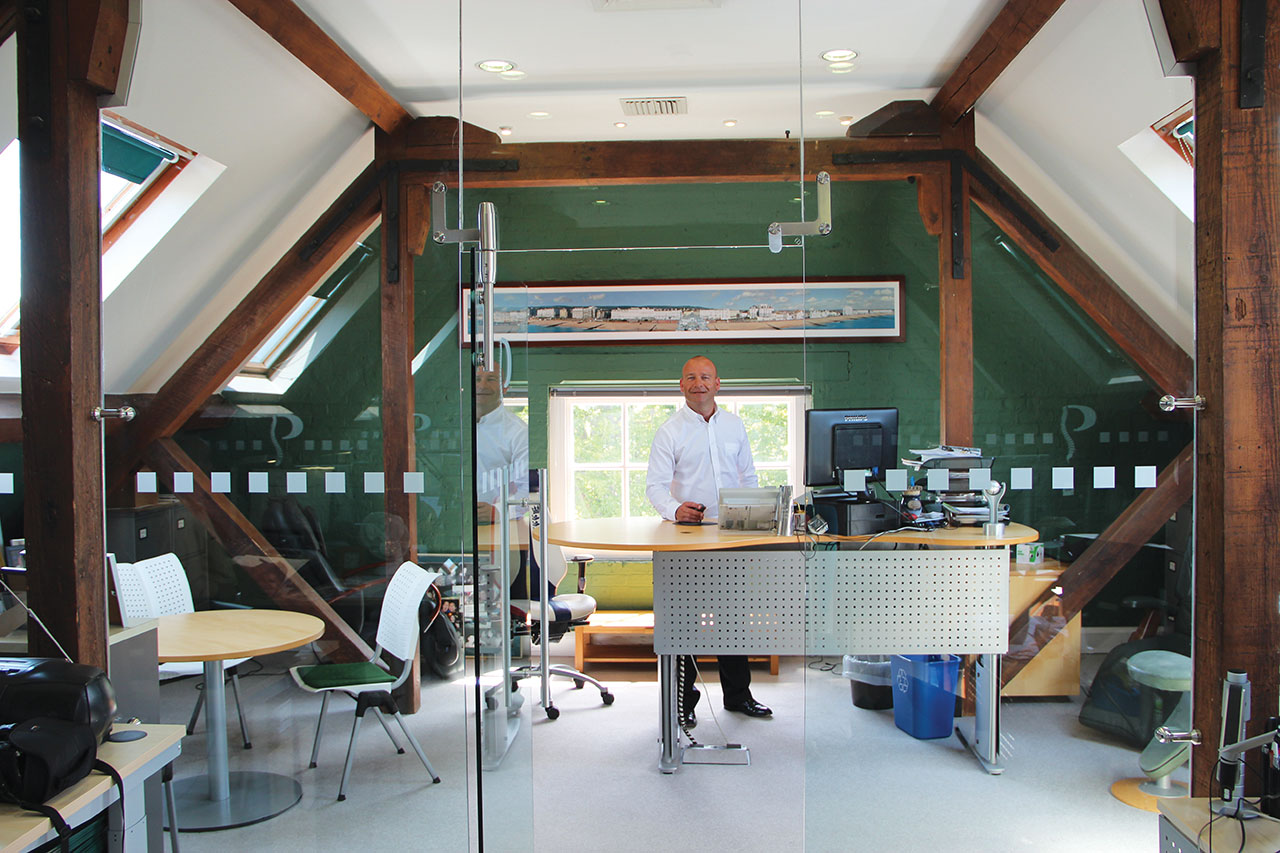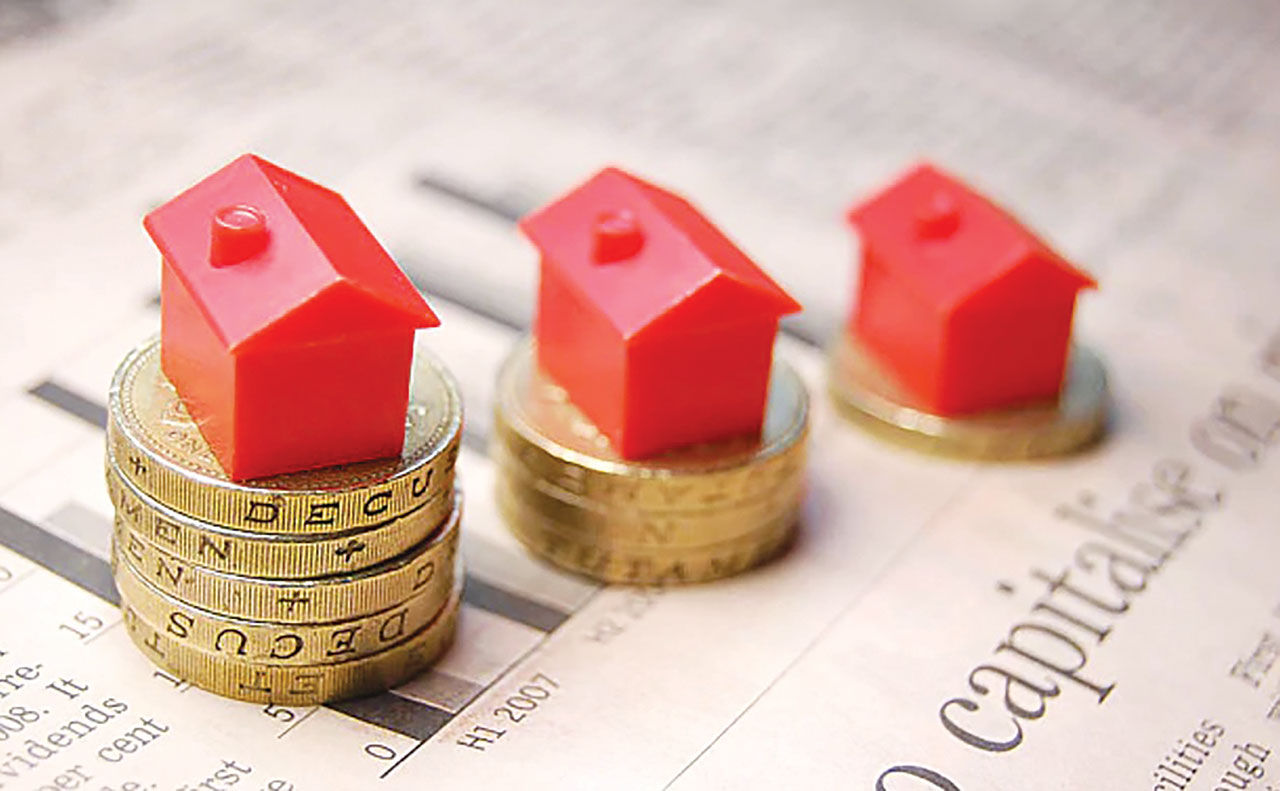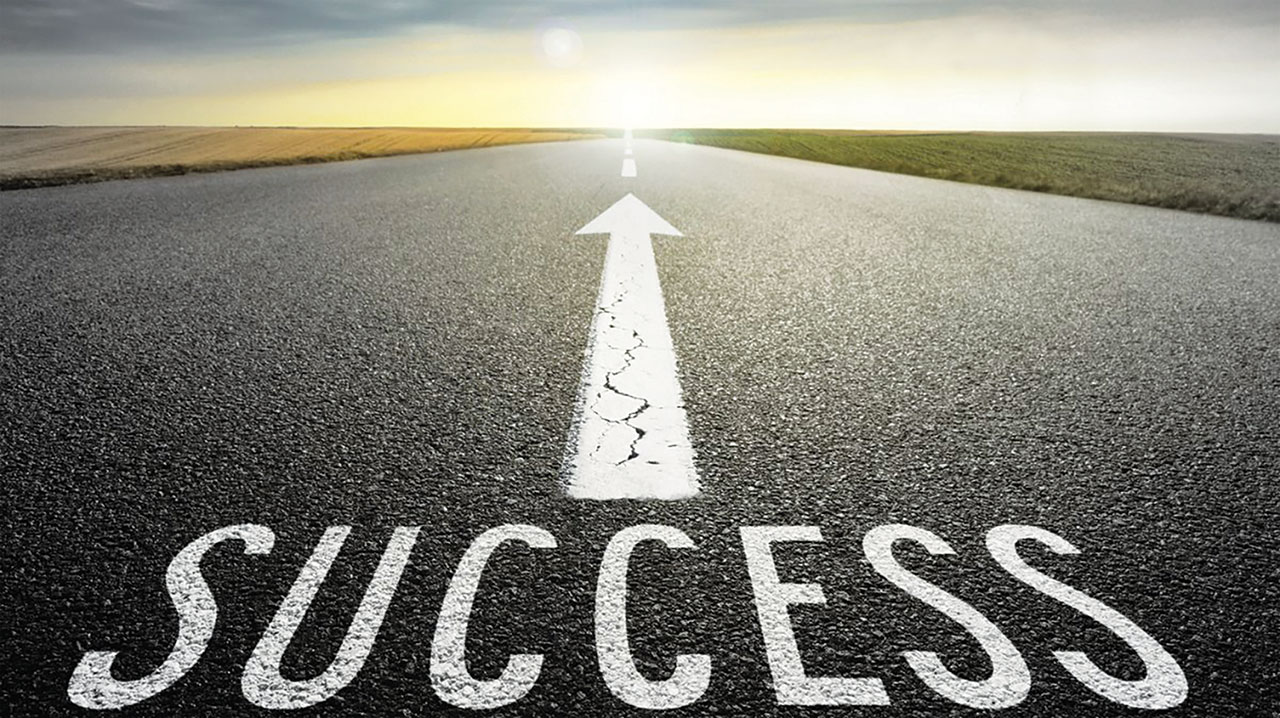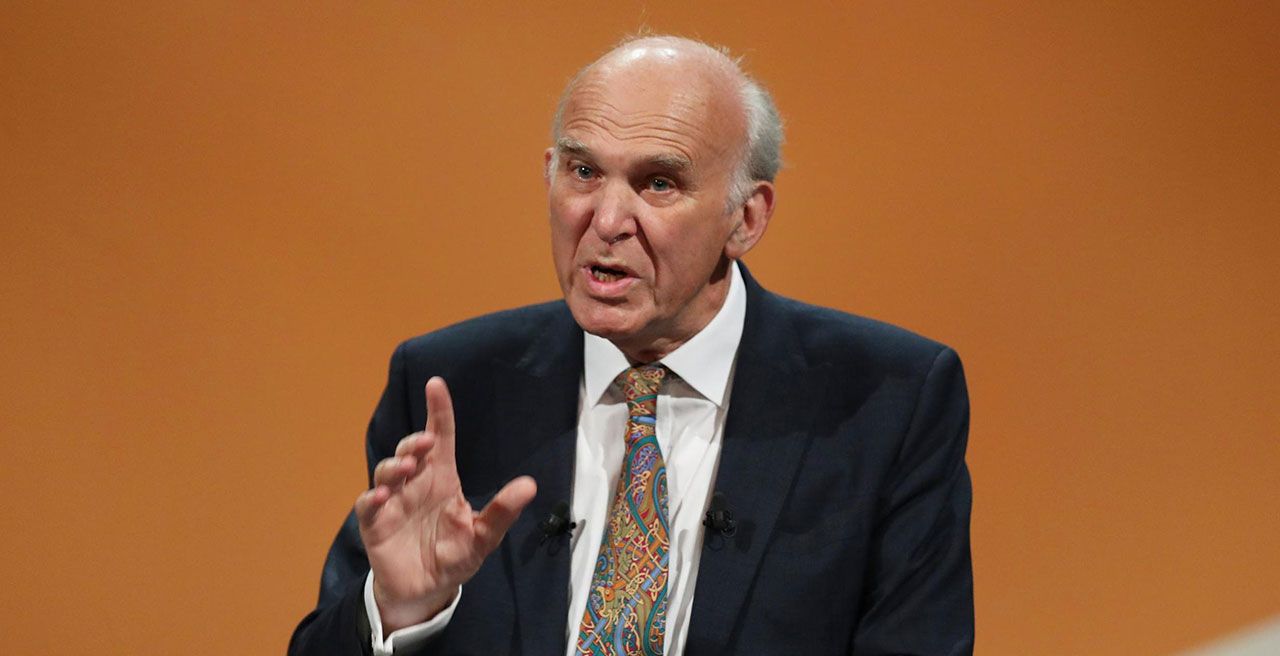
During the referendum, it appeared that most of the polictical classes were firmly in the Remain camp. Where did they all go? Some accepted the vote and moved on, others moved away from politics totally, and many (especially in the Labour Party) just decided to keep a low profile.
A tiny minority decided to keep the fight going, campaigning for an ‘Exit for Brexit’. Of the established English political parties, only the Liberal Democrats under Sir Vince Cable, have maintained their outright oppostion to Brexit. Can a Brexit Exit really happen?
Ian Trevett met with Sir Vince Cable to ask this and other questions when Sir Vince Cable headlined the Sussex Economic Forum in November.
Since the referendum a lot of people who were very vocal against Brexit have gone quite quiet. So you’ve almost become the standard bearer for the remain campaign. Is that a position you’re comfortable with?
It is a big swathe of public opinion. I was looking at the surveys yesterday [16th November] and there are about 45% who are completely committed to following through on the Brexit vote, whatever the outcome. There are about 30%, who are in the position I am, who believe that Brexit was a bad mistake. They accept the referendum result but believe the public should be given a choice at the end of the negotiations to decide whether they want to press on or choose the so-called ‘Exit from Brexit’.
There is a lot of demand in the country that we should take stock once we get to the end of the negotiating process. And then there is another group who are somewhere between the two - just waiting to see how it all turns out, whether we have the soft or hard approach. Although I would claim to be speaking for about 30% of the population this might well go up to 50%, depending on what happens in the next year or so.
Up to now, the ‘divorce bill’ has dominated the agenda, but I don’t remember it ever being mentioned at all in the lead-up to the referendum.
That’s why a lot of the argument for Brexit was so disingenuous such as the belief that, somehow, if we leave we get oodles of money to spend on the health service. There was that infamous promise which even Nigel Farage had to distance himself from.
Divorce, whether it’s between two individuals or countries, is inevitably a messy and expensive process. The fact is there are outstanding obligations and the British government said that it will honour them. How much it finishes up paying is obviously a matter for the negotiations but there are large numbers of projects, for example, that have started with British approval and support. They have to be financed, we have a share of that. There are the salaries and pensions of people who come from the UK to work officially or politically, and those have to be honoured. There is enormous scope for arguing about how much or how little but there clearly are financial obligations.
During the referendum, many from the leave camp insisted that we would pay nothing to the EU if we were to leave. Is that a possibility?
Boris Johnson, I think, said we’re not going to pay anything. Well, actually we are. To be frank, where I’m coming from I wouldn’t be paying, either, because I don’t think we should be leaving. But that’s a rather different kind of argument. But if we are leaving in an orderly way with the agreement of the European Union countries and wish to press on with a new kind of trade relationship, then the financial obligations have to be settled and they’re going to be fairly substantial.
How likely is an ‘Exit from Brexit?
I wouldn’t say that’s the most likely outcome but it’s still possible. It is quite possible, I think, that Brexit could never happen. It could happen in that way because the whole process just becomes so complicated, so difficult, so messy that eventually as we get closer to the end point, large numbers of people might say: “Oh my God, is this really what we want?” and then there may be a growing call for a fresh vote on the issue.
There hasn’t been, so far, a groundswell of opposition to Brexit. What factors might create such a movement?
You are right, there hasn’t been a groundswell of opposition and I suspect that’s because the impacts haven’t been felt. They won’t be felt for some time. At the moment people are beginning to feel a squeeze on their incomes because of higher food and energy prices because of the devaluation following the vote. We’re beginning to see an exodus of Eastern Europeans which is undoubtedly affecting the quality of services and business but it’s not hitting people in the face.
There is a slowdown in investment and this is what’s slowing down the economy and so the government is getting less revenue, so there’s a squeeze on public spending. But this is all happening in slow motion and it’s not dramatic and it will be some time before the public actually feel the pinch. I worry that we do get into Brexit irrevocably and then the economic impacts start coming down the track big time in a few years’ time and then it’s too late.
What of the argument that by removing the shackles of the EU there will be huge benefits in terms of international trade?
I think that’s complete nonsense. And actually, to be fair to some of the Brexiters, they don’t argue that, either. The more rational ones will argue that we are going to take an economic hit but it’s justified to have control over our frontiers and to be able to manage immigration. Or they’ll say – and I think this is not a completely stupid argument – that certainly for 10 years Britain is going to be poorer but it may be that eventually things turn round and in the next generation things could be better. I don’t believe that, but that seemed to me a reasonable way of putting the Brexit argument.
Like other vocal Remainers, you come in for a lot of criticism from the newspapers and other commentators, as you are refuse to accept the will of the people. How do you handle that?
I do accept the will of the people. We have had the referendum and the government is getting on trying to do something about it. It’s because I believe in the will of the people that I think we should consult them again when we know what the facts are. I’m not debating from that elitist point at all. As for this phrase, ‘the will of the people’, I do think we need to see a certain irony in it. It now appears that at least part of the people consists of Mr Putin and the Russians tweeting from factories in St. Petersburg. I think we need to be a little bit careful about our democracy.
Do you think the Russians have had a big influence, as has been alleged in the American Presidential election?
They certainly had an influence. We now know that. A whole variety of newspapers – The Times, The Guardian, The Mail on Sunday – have all produced pretty hard evidence that the Russians were hard at it trying to persuade people to vote Brexit because they thought this was a very good way of breaking up European unity, which of course they see as a threat to themselves. So they had an influence. Whether it was decisive I don’t know.
During the vote, there were political alliances which crossed traditional party lines, but party divides have returned with the Labour Party reinventing itself as a left wing party. Is there a likelihood of a resurgent centrist party to fill the gap that has been created?
It hasn’t happened so far but I’m optimistic that what I call the common sense middle will assert itself. In terms of the Liberal Democrats, our position hasn’t directly changed from what it’s been over the last four or five years, which is just under 10% of public opinion. This is not satisfactory from my point of view. We need to get well up into the teens. But I think this will happen once the facts start to settle around Brexit.
At the moment quite a lot of remain Conservatives and moderate Labour people are keeping their heads down. They don’t know quite what’s going to happen. I think the cracks might first appear in the Labour Party because there are some very good, sensible Labour people who are now threatened with being deselected by the extremists within their own party. Just look along the coast to Peter Kyle in Hove, that’s a place quite near home where this might happen. And these people will then be faced with a choice. Do you just quietly accept being assassinated or do you do something about it and work with people in other parties?
So I think within a couple of years, maybe even sooner, we may see a significant shift and what you rightly describe as the currently silent centre emerges.
Did you really want to be leader of the Liberal Democrats? It seemed that you were the only person willing to step forwards.
There were candidates initially, but then they decided for a variety of reasons, family reasons and otherwise, they didn’t want to do it. But nonetheless I think I’ve got at least the potential to turn things round and make a really big difference. So I’m not intimidated by it.
It’s got its challenges but I think it’s also a very important position. I take it as an honour and I’m working very hard on it.
Of course, you’ve been in government before in the coalition.
Yes, I had a major job in the coalition government. I think at the end of it I did a lot of good things. I launched an apprenticeship revolution, a lot of work around innovation and science, set up the British Business Bank which has done a lot to help small business, the Green Bank, which unfortunately this government have privatised. We did a lot of good things around the industrial strategy and I hope the long-term legacy will be a positive one.
Although the coalition had its critics,there was a period where people were working together. That seems to be a complete absence in politics now.
Yes, and it’s very sad, actually. I was never very comfortable with the Conservatives. I see them as political opponents but the fact that we were able to sit down and work with them and do useful things, make decisions and provide good government was quite a grown-up way of doing politics. And as you rightly say, all of that is now gone. We’ve gone back to the most primitive form of tribal politics. Working together is something that parties simply won’t do anymore. It’s very sad, actually, Anyway, I have faith that a more grown-up approach in these things will eventually prevail.
Is it right that you predicted the 2008 crash?
I didn’t predict it in all its gory detail and I don’t think any of us quite understood the extent to which the banks had become totally enmeshed in these very complicated financial products which unravelled. But I certainly did predict that the boom in house prices and consumer credit during the Gordon Brown period was all going to come to a very sticky end. I believed that the banks were behaving very irresponsibly and would eventually pay the price for it.
Some of us did see that coming, and I’m afraid that some of those elements are now coming back again because we’ve got some quite irresponsible lending behaviour taking place now. House prices are way overvalued. You can see the ingredients of not necessarily a repeat of the financial crash but something quite messy.
What are the most pressing issues aside from Brexit?
I’m very concerned at the lack of attention to the underlying long-term weaknesses of the British economy - the poor productivity and the lack of attention to training and skills. All that is being pushed into the background and it’s probably now going backwards. We really need to build up our sciences, our creative industries. You need to take a very long-term view about that, which is why we had the industrial strategy when I was in the government.
The housing crisis is just so serious. It is not just bricks and mortar and wanting a few more houses built, that’s not the issue. It’s the way that it’s affected fairness between generations, where younger people simply can’t even begin to contemplate buying their own home until they’re well in their 40s, and they are growing up in an environment of insecurity. Getting a better balance in the housing market is absolutely fundamental. The younger generations are simply unable to get secure employment and their living standard has gone down substantially in the last 10 years.
I bought a house for £13,000 in the mid-70s, it’s now probably worth getting on for £1 million. And I haven’t done anything to deserve that, I’m just sitting in it. That’s a phenomenon across the country. I grew up with stable employment, career progression, a final salary pension scheme and we all had that. The younger generation don’t and we really have got to redress the balance.
Are still waiting for the call from Strictly Come Dancing?
I was on the Christmas show in 2010 and I got a 10 from Len Goodman, which was the highlight of my CV. I tried to keep it going in the two years when I was out of parliament. I did some quite serious competitions in Blackpool. I now struggle to get my weekly class in but I’m determined to keep going.



